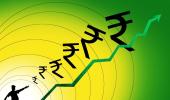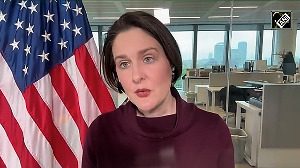As much as Rs 47,810 crore was spent on share buybacks by 48 companies in 2023 -- the highest amount since 2017.

This surge in value was largely driven by a few large-sized issues, including those by Tata Consultancy Services (Rs 17,000 crore), Larsen & Toubro (Rs 10,000 crore), and Wipro (Rs 12,000 crore).
In 2022, 58 companies had repurchased shares worth Rs 38,305 crore, according to data from Prime Database.
Other prominent buybacks last year were those by Piramal Enterprises (Rs 1,750 crore), Hinduja Global Solutions (Rs 1,020 crore), Triveni Engineering & Industries (Rs 800 crore), and Gujarat Narmada Valley Fertilizers & Chemicals (Rs 653 crore).
A buyback is a process that a company employs to repurchase its shares from stakeholders.
The bought-back shares are extinguished and the company's equity base shrinks, enhancing its financial ratios, such as earnings per share and return on equity.
This process is carried out either through the tender route, where shareholders surrender their shares to the company in response to an offer received from it, or the open market (the company buys its shares in the open market).
Buybacks have become increasingly popular over the years.
Cash-rich companies with high promoter holdings, especially, prefer buybacks over dividends to return excess cash to their shareholders.
Any company that buys back its shares has to pay a buyback distribution tax (BDT) on 23.29 per cent of distributed income.
Distributed income is calculated by deducting the consideration paid by the company on account of buyback from the amount received by the company for the issue of such shares.
"While the company is liable to pay BDT when purchasing its own shares, the receipt of the buyback price in the hands of shareholders is exempt.
"To avoid higher tax costs in the hands of individuals falling under higher income tax brackets, buyback proves to be more tax efficient.
"However, in the open market route, the tax treatment does not change for corporates; the income from buyback becomes taxable in the hands of shareholders," said Rajarshi Dasgupta, executive director and national head of tax, AQUILAW.
According to analysts, it is often beneficial for investors to tender shares during a buyback, as the offer is typically at a premium to the market price.
If a company is generating free cash flow and if it does not have any immediate need as far as expansion of capacity or getting into new lines of business is concerned, it can go for buyback.
Often, companies announce buybacks at a premium, drawing investors who come for arbitrage opportunities.
And the opportunity increases if the promoter or a section of shareholders abstain from tendering shares, explained U R Bhat, co-founder of Alphaniti Fintech.
IT companies, which typically don t have large capital expenditure requirements, have been significant contributors to buyback offers in recent years.
G Chokkalingam, founder of Equinomics, said: For some years, their dollar revenue has been growing in poor single digits.
If companies hold on to cash, their return on capital employed (RoCE) will suffer.
For returning shareholders, especially larger ones, it's better to do a buyback than pay dividends because it s more tax efficient.
He said retail investors should tender if there is a premium to the market price.
And if the valuation comfort is no longer there in the company, they should use the buyback to exit as much as possible.
However, he cautioned against buying shares to participate in buybacks.
Not every share that gets tendered gets repurchased, Chokkalingam added.












 © 2025
© 2025